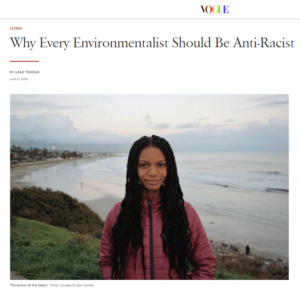Why Every Environmentalist Should Be Anti-Racist – BY LEAH THOMAS – June 8, 2020
Environmentalists tend to be well-meaning, forward-thinking people who believe in preserving the planet for generations to come. They will buy reusable cups, wear ethically made clothing and advocate for endangered species; however, many are hesitant to do the same for endangered Black lives, and might be unclear on why they should.
As a Black environmentalist, I’ve struggled with this. Why is fighting for my humanity considered an optional or special add-on to climate justice? I’ve stood beside white environmentalists during climate protests, but I’ve felt abandoned by my community during acts of unjustifiable violence toward Black and Brown people. I’ve had enough. The time is now to examine the ways the Black Lives Matter movement and environmentalism are linked.
During the summer of 2014 I was on break from college in my hometown of Florissant, Missouri, when Michael Brown, an unarmed Black teenager, was shot at least six times by a police officer before dying in the street just a few miles from my house. His body lay there uncovered for hours as the community tried to piece together what happened without communication from authorities. Tension boiled over, and uprisings followed. Then I had to go back to Southern California to continue on with my environmental science and policy degree.
Spending time in nature during the Ferguson uprisings helped me process the trauma of what was happening back home, yet I felt guilty at the same time. While I was at the beach or hiking, my family and friends were back home dodging tear gas during protests to fight for my civil rights. Why was I entitled to clean air, water, and abundant nature in Orange County when communities like Ferguson around the country were not, both during times of unrest and beyond?
Give Today
Founder
Student
Individual
Senior
Family
Other

